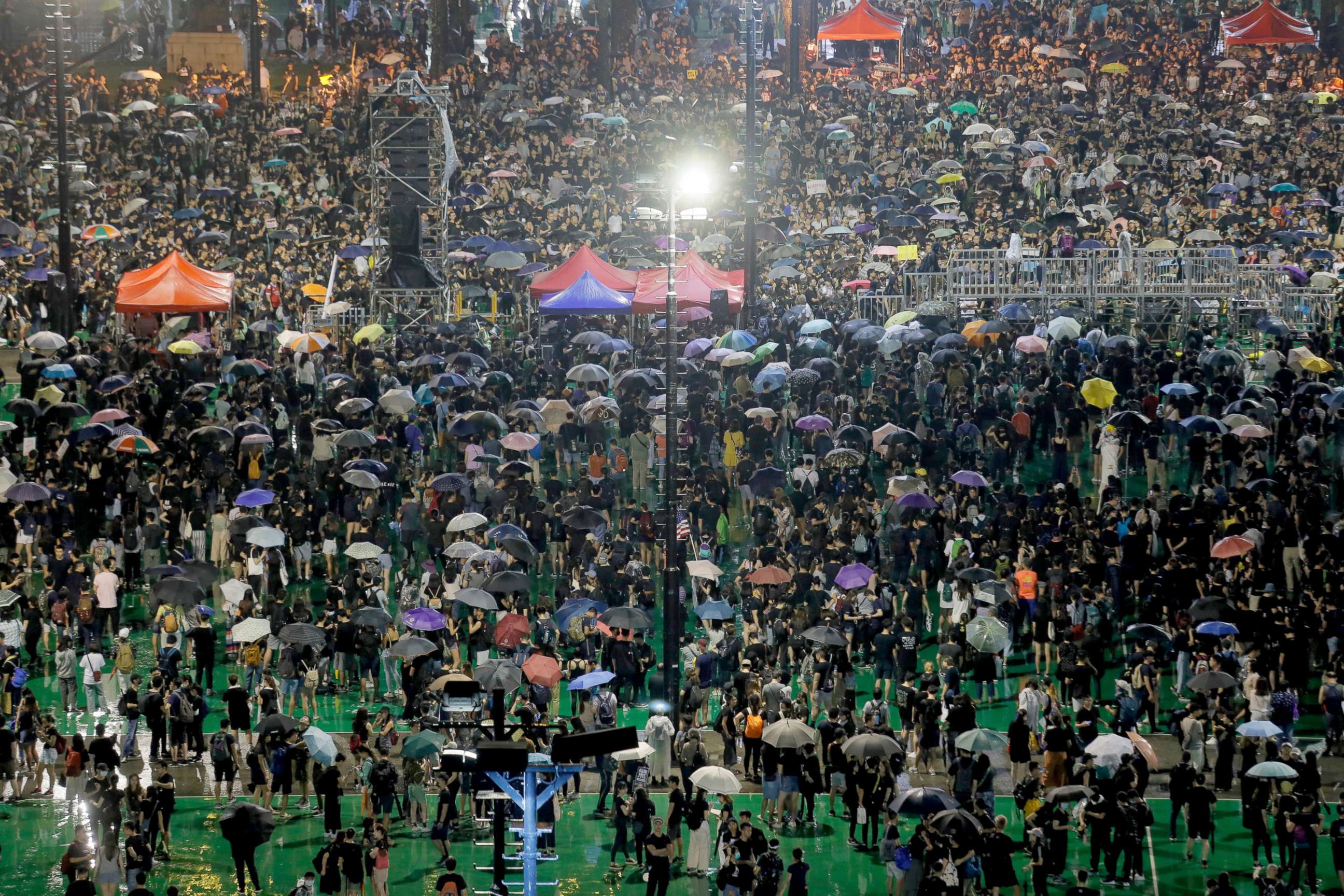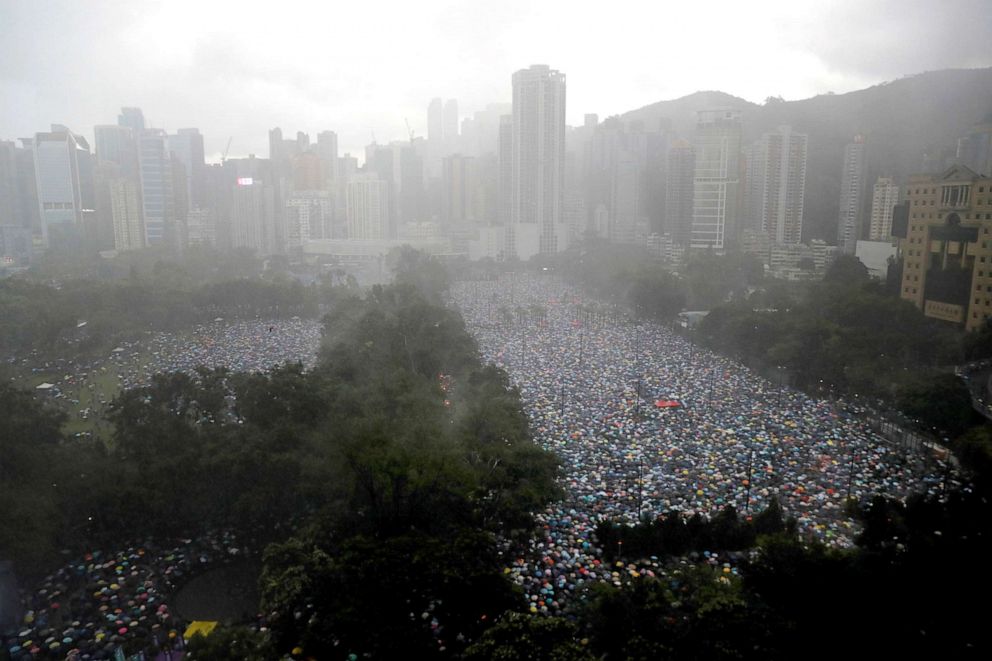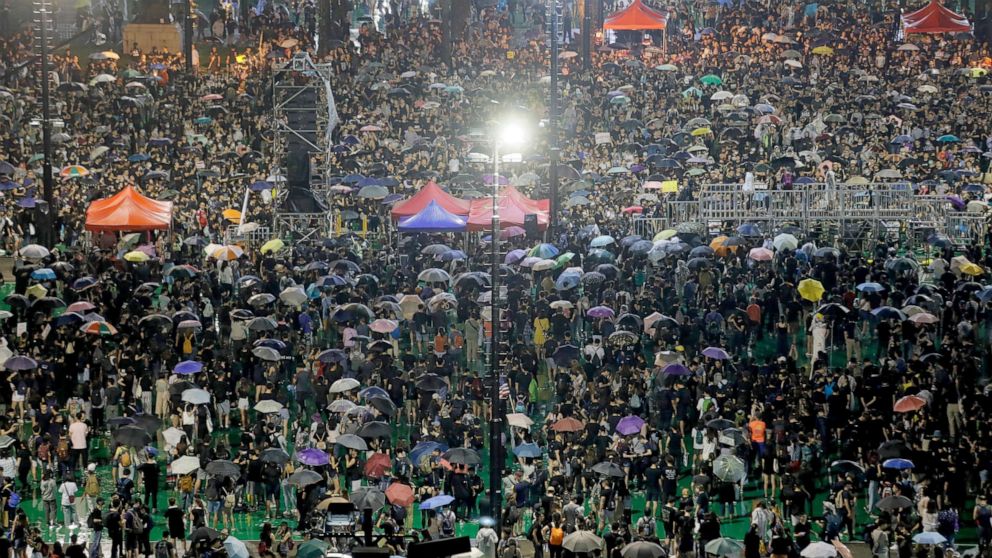Largest pro-democracy protest yet in Hong Kong fills major park, spills into streets
Tens of thousands of protesters defied a rainstorm and the threat of more clashes with police on Sunday in one of the biggest pro-democracy demonstrations yet in Hong Kong.
Demonstrators, whom police denied a permit to march, filled a major park and spilled into surrounding streets, which remained packed with protesters late into the night.
For the most part, the daylong demonstration has been peaceful, but participants expressed fear that circumstances could change on a dime as the Chinese government ratcheted up its threats to quash the civil unrest, now in its eleventh week in the semi-autonomous territory.

"I'm scared, of course. Really scared. Yeah," a protester wearing a mask, sunglasses and a black cap told ABC News. "But I think this is worth it to find our democracy and freedom."
Many of the protesters taking part in Sunday's rally wore masks to protect their identity. Protesters also wore patches over their right eyes to symbolize solidarity with a woman they say was shot in the eye by a projectile fired by police during a protest on Aug. 11.
Without freedom, my son will not have hope.
As protesters began congregating at Victoria Park on Sunday morning, Chinese paramilitary police were staging by the thousands in a sports stadium just outside Hong Kong in the neighboring town of Shenzhen.
The riot-ready troops conducted drills with tanks in what many protesters said they suspect was a thinly-veiled threat.
Hong Kong government officials issued a statement Sunday night saying that while the protest was generally peaceful, the demonstrators managed to block a number of thoroughfares on Hong Kong Island, "seriously affecting traffic and causing much inconvenience to the community."
"The Transport Department and the Police have actively coordinated with concerned parties to minimize the impact," the statement reads.

A spokesman for the Hong Kong government emphasized that it was "most important to restore social order as soon as possible."
"The Government will begin sincere dialogue with the public, mend social rifts and rebuild social harmony when everything has calmed down," the spokesman said.
By 3 p.m. local time, an area designated for the protest was overflowing with demonstrators, who formed a sea of umbrellas that stretched into neighboring streets. Organizers of the demonstration claimed that 1.7 million people participated in the protest, but police, according to Hong Kong Free Press, put the number at only 128,000.
A protester who would only give his first name as Phillip told ABC News that he joined the demonstration because Hong Kong government leaders "do not listen to the people."
"We will stay together and voice out," Phillip said.
Many demonstrators said they are worried that their freedoms will continue to erode as China's Communist Party-ruled central government keeps flexing its muscle in Hong Kong, the former British colony that was given back to China in 1997 and has since become a global financial hub.
Under the constitutional principle of "One Country, Two Systems," China had agreed to keep its hands off the freedoms Hong Kong residents have enjoyed as a semi-autonomous territory. But protesters say the Chinese government has exercised its power to curb democracy in Hong Kong in violation of the agreement.
A young couple with a baby told ABC News they participated in the protest because they are afraid for their child's future.
"Without freedom, my son will not have hope," said the father, adding that he was there to "fight for Hong Kong."
The massive protests started in early June when hundreds of thousands of pro-democracy demonstrators marched in Hong Kong against an extradition bill government leaders there had reached with the Chinese government. The bill was suspended as the protest grew larger and louder.
Demonstrators are also demanding democratic election, an investigation of police use of force, and the resignation of Hong Kong's chief executive, Carrie Lam, whom protesters consider a tool of the Chinese government.
Clashes between protesters and police grew more intense last week when demonstrators organized a city-wide strike and stormed Hong Kong International Airport, forcing the cancellation of numerous flights in and out of the world's busiest airport for two days.
On Tuesday, violent clashes erupted between protesters and paramilitary police at the airport. Baton-wielding officers were caught on video using force on demonstrators to take back control of the airport.
Chinese officials said Tuesday that protesters "have begun to show signs of terrorism," and China appeared to be weighing a crackdown on the democratic movement.
President Donald Trump told reporters last week that he hopes the situation in Hong Kong "works out for everybody, including China, by the way," and that "nobody gets killed."
On Sunday, You Wenze, spokesman of the Foreign Affairs Committee of China's National People's Congress, warned U.S. politicians to stay out of China's internal affairs in Hong Kong. Wenze accused U.S. congressional members of glorifying violent crimes under the guise of protests for human rights and freedom.
U.S. House Speaker Nancy Pelosi issued a statement last week saying, “The escalating violence and use of force perpetrated against the Hong Kong protesters is extremely alarming. The pro-Beijing Chief Executive and the Hong Kong police forces must immediately cease the aggression and abuse being perpetrated against their own people."




